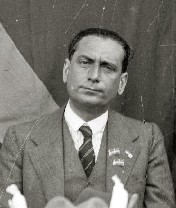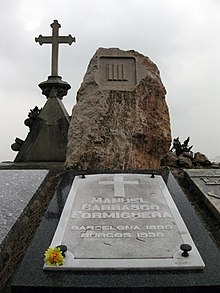Manuel Carrasco Formiguera

Manuel Carrasco i Formiguera (3 April 1890[1] – 9 April 1938), was a Spanish lawyer and Christian democrat Catalan nationalist politician. His execution, by order of Francisco Franco, provoked protests from Catholic journalists such as Joseph Ageorges, the President of the International Federation of Catholic Journalists. Ageorges wrote, "Even more than the death of the Duke of Enghien stained the memory of Napoleon, the death of Carrasco has stained the reputation of Franco". Such protests, in turn, provoked the anger of the Francoist press.[2] His funeral in Paris on 27 April 1938 was attended by many notable people, including Joan Miró, Ossorio y Gallardo, Josep M. de Sagarra, Joaquim Ventalló and Jacques Maritain and his wife Raissa.
Early life
He was born in
Second Spanish Republic
In 1930, Carrasco was one of the signatories of the
Spanish Civil War
At the start of the
Death

The execution of the sentence was delayed eight months and took place on 9 April 1938,
On 25 September 2005 the Spanish Congress of Deputies agreed on a proposal from Convergence and Union, to nullify the court martial that Carrasco had been subjected to.[17]
References
- ISBN 9788472022638.
- ^ Raguer, p.175
- ^ Hilari Raguer, Gunpowder and Incense, p.163
- ^ Julía, Santos; Casanova, Julián; Solé i Sabaté, Josep Maria; Villarroya, Juan; Moreno, Francisco. Víctimas de la guerra civil. Editorial Temas de Hoy. Madrid. 2006. p.228
- ^ Raguer, p.163
- ^ Raguer, p.163
- ^ Julía, Santos; Casanova, Julián; Solé i Sabaté, Josep Maria; Villarroya, Juan; Moreno, Francisco. Víctimas de la guerra civil. Editorial Temas de Hoy. Madrid. 2006. p.228
- ^ Raguer, p.164
- ^ Preston, Paul. El holocausto español. Odio y exterminio en la guerra civil y despues. Debate. Barcelona. 2011. p.600.
- ^ Raguer, p.167
- ^ Raguer, p.168, quoting Col i Alentorn
- ^ "Biografía de Manuel Carrasco en la web de la Unió de Joves de UDC". Archived from the original on 18 April 2011.
- ^ Raguer, p.172
- ^ Raguer, p.175
- ISBN 978-84-8460-333-7, pg. 229, donde se cita a Hilari Raguer
- ^ Julía, Santos; Casanova, Julián; Solé i Sabaté, Josep Maria; Villarroya, Juan; Moreno, Francisco. Víctimas de la guerra civil. Editorial Temas de Hoy. Madrid. 2006. p.229
- ^ "El Congreso acuerda anular el consejo guerra a Carrasco i Formiguera. Noticia de la Agencia EFE, citada por el Equipo Nizkor".
Bibliography
- Julía, Santos; Casanova, Julián; Solé i Sabaté, Josep Maria; Villarroya, Juan; Moreno, Francisco. Víctimas de la guerra civil. Editorial Temas de Hoy. Madrid. 2006. ISBN 84-8460-476-4
- Preston, Paul. El holocausto español. Odio y exterminio en la guerra civil y despues. Debate. Barcelona. 2011. ISBN 978-84-8306-852-6
External sources
- Carrasco i Formiguera: la defensa de la fe y del país hasta la muerte no conoce ideologías políticas, en catholic.net
- Diario de sesiones del Congreso de los Diputados de 27 de septiembre de 2005, en la que se debatió y aprobó la proposición no de ley de CiU para la anulación del consejo de guerra en el que se condenó a Carrasco i Formiguera.
